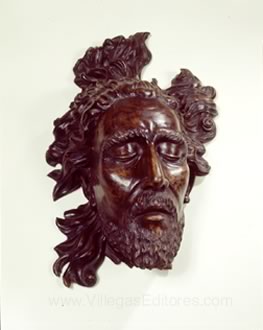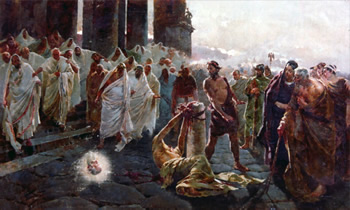A Desert and a Dungeon:
God's Presence in our Place
For Sunday December 9, 2012
Second Sunday in Advent
Lectionary Readings (Revised Common Lectionary, Year C)
Malachi 3:1–4 or Baruch 5:1–9
Luke 1:68–79
Philippians 1:3–11
Luke 3:1–6
Two summers ago my wife and I attended my nephew's wedding in New York. On the drive back to the Newark airport we took a detour through Drew University, where I had gone to grad school. Many things looked just the same as we circled the campus loop. Much else had changed. After a few minutes, we came to the chocolate brown "efficiency" apartment where we had lived for three years. When we got out of the car, without any warning, we were both hit with a wave of emotions.
I hadn't been to that campus in twenty-six years, yet there was something powerfully evocative about going back. There's no mistaking the power of place.
In the gospel this week, John is in the Judean desert. In the epistle, Paul is in a Roman dungeon. Neither a desert nor a dungeon is a place that you'd expect to experience the presence of God. I've flown from Europe south over the Sahara Desert; it's a vast expanse of sandy nothingness. A dungeon, by contrast, epitomizes confinement and constriction. Nonetheless, the desert and the dungeon were both places where God spoke and acted.
Luke specifies the exact time when "the word of God came to John son of Zechariah." The "fifteenth year of the reign of Tiberius Caesar" dates his story to about the year 26 AD. Luke also identifies the political context; the word of God came to John the Baptist "when Pontius Pilate was governor of Judea, Herod tetrarch of Galilee, his brother Philip tetrarch of Iturea and Trachonitis, and Lysanias tetrarch of Abilene."
 |
John the Baptist, wood sculpture by Santiago Martinez Delgado. |
After naming Rome's political powers, Luke identifies Jerusalem's religious establishment; the story takes place "during the high priesthood of Annas and [his successor] Caiaphas."
These minor details reveal a major theme in the story of Jesus. The “word of the Lord" through John the Baptist didn't originate with the imperial powers of Rome. Nor from Israel's religious establishment, even though John's father Zechariah was a priest in the Jerusalem temple. It didn't come from someone dressed in fashionable clothes who lived in an expensive palace, said Jesus (Luke 7:25). Nor from a business board room, university laboratory, ski lodge or power lunch.
God's word to all humanity came from a wild and woolly man who lived in the deep of the desert, on the fringes of society rather than in its corridors of power, at the periphery rather than at the epicenter. The divine messenger and his message originated in an unlikely place and from an improbable source. John would have been easy to ignore if you expected or wanted something normal, safe, or traditional. But neither John nor his message was normal by any stretch of the imagination. His message of repentance was both an "invitation and indictment," says Marcus Borg.
John might have been part of the apocalyptic Jewish sect of Essenes who opposed the temple in Jerusalem. This much is clear — he was a prophet of radical dissent; his detractors said that he had a demon (Luke 7:33). In the end, he paid the price for faithfulness to his prophetic calling. About six months after John emerged from the desert like some scraggly lunatic and baptized Jesus, he was beheaded at the whim of Herod the tetrarch.
As for Paul, in his book What Paul Meant (2006), the historian Garry Wills describes him as a "heroic traveler" who logged more than ten thousand miles spreading the good news of God's love. Given the subsequent global expansion of Christianity, Paul remains one of the most influential people in history. But in the epistle for this week, Paul isn't going anywhere at all. He's languishing in jail.
In his letter to the Philippians, Paul mentions the "chains" of his imprisonment five times. In other epistles he mentions them another five times. Paul spent significant time in prison.
Despite warnings from his companions that Jewish leaders accused him of forsaking the Mosaic law, Paul insisted on going to Jerusalem. He delivered relief aid to the church there that he had collected from churches in Asia and Europe. Sure enough, he was arrested in Jerusalem, and then transferred 60 miles northwest by armed guard to the governor Felix at Caesarea. In Caesarea he languished in prison for two years while Felix vainly hoped for a bribe. When the next governor Festus suggested that he ought to be remanded to Jerusalem for trial, Paul invoked his Roman citizenship and appealed his case to Rome.
 |
Paul Beheaded, by Enrique Simonet (d. 1927). |
Paul had never been to Rome, and had written the believers there that he intended to visit them. He did make it to Rome, though under very different circumstances. In Rome, he wrote Timothy, he was "chained like a criminal" (2 Timothy 2:9).
But Paul wasn't concerned about his confinement. He told the Philippians that the gospel was spreading because of his imprisonment. Indeed, under house arrest at Rome he was able to meet with friends. It's thought that he composed his four "prison epistles" during this time — Ephesians, Philippians, Colossians, and Philemon. He learned how the gospel that had started in the religious center of Jerusalem in the east had migrated to the imperial center of Rome in the west.
Despite the power of an oppressive place, Paul remained confident. He might be in chains, he wrote to Timothy, "but the word of God is not imprisoned." The Bible doesn't say where or how Paul died, but according to tradition he was beheaded under Nero about three miles outside of Rome on the Ostian Way.
In the desert, in a dungeon. Whatever space or place we find ourselves this Advent, God will meet us there. For Mary, a peasant teenager from a working class neighborhood of carpenters in Nazareth, a village so insignificant that it's not mentioned in the Old Testament, in the historian Josephus (c. 37–100), or in the Jewish Talmud, her angelic encounter took place in an unknown, ordinary house.
In his book Searching for Home (2003), Craig Barnes, pastor of National Presbyterian Church in Washington, D.C. from 1993–2002, uses Dante's Divine Comedy and the journey toward home metaphor to explore the pilgrim motif of discipleship. He reminds us that the truly good news of Jesus is that "all of the roads belong to God," and that "the Savior can use any road to bring us home." Quoting CS Lewis, he reminds us that God can even use the wrong roads to take us to the right places.
For further reflection
From John Chryssavgis, In the Heart of the Desert; The Spirituality of the Desert Fathers and Mothers (2003):
"In the deserts of the heart
Let the healing fountain start."
WH Auden, "In Memory of WB Yeats"
"The road of cleansing goes through that desert.
It shall be named the way of holiness."
Isaiah 35:8 (LXX)
Image credits: (1) Wikipedia.org and (2) Wikipedia.org.





